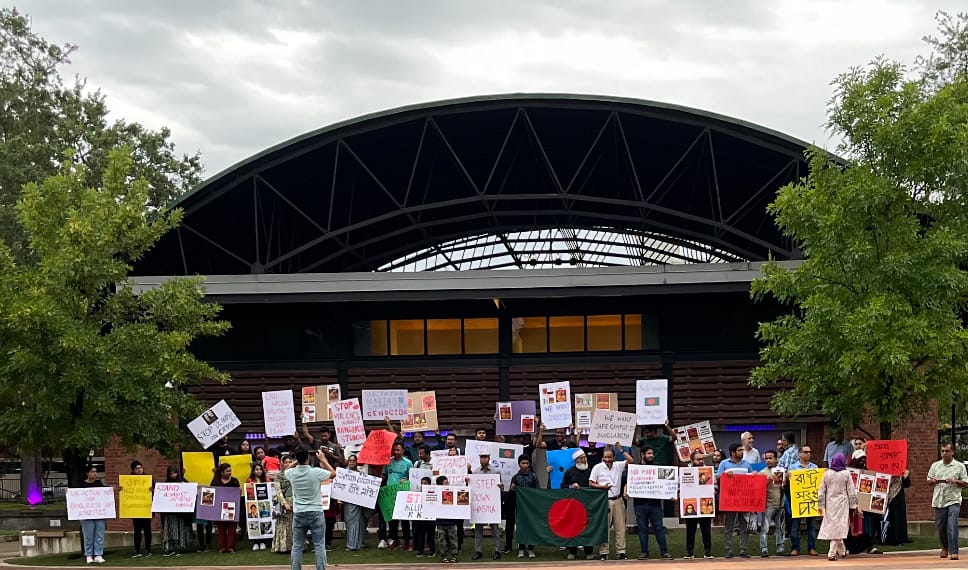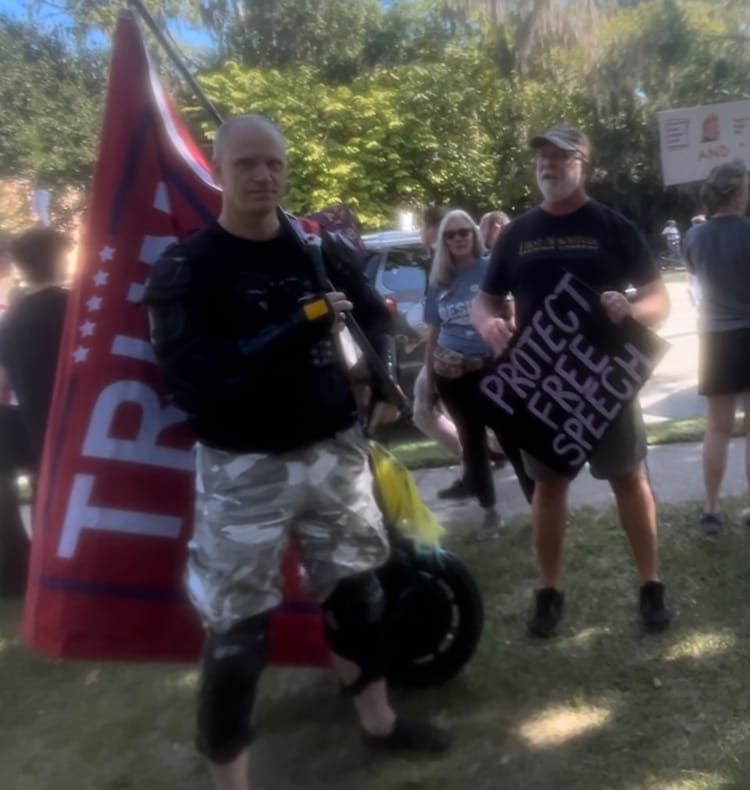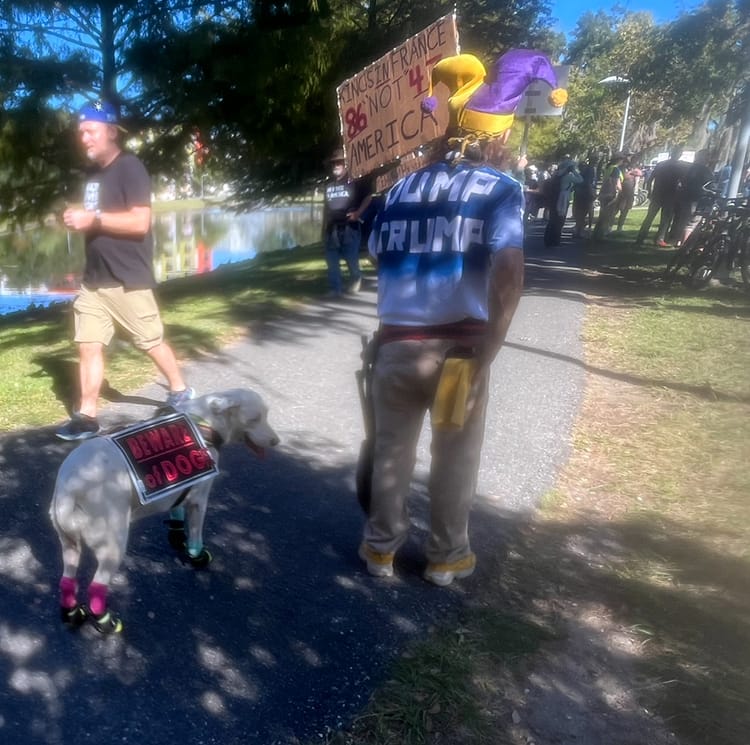Bangladeshi Gainesville Residents Protest PM Sheikh Hasina at Bo Diddley Plaza
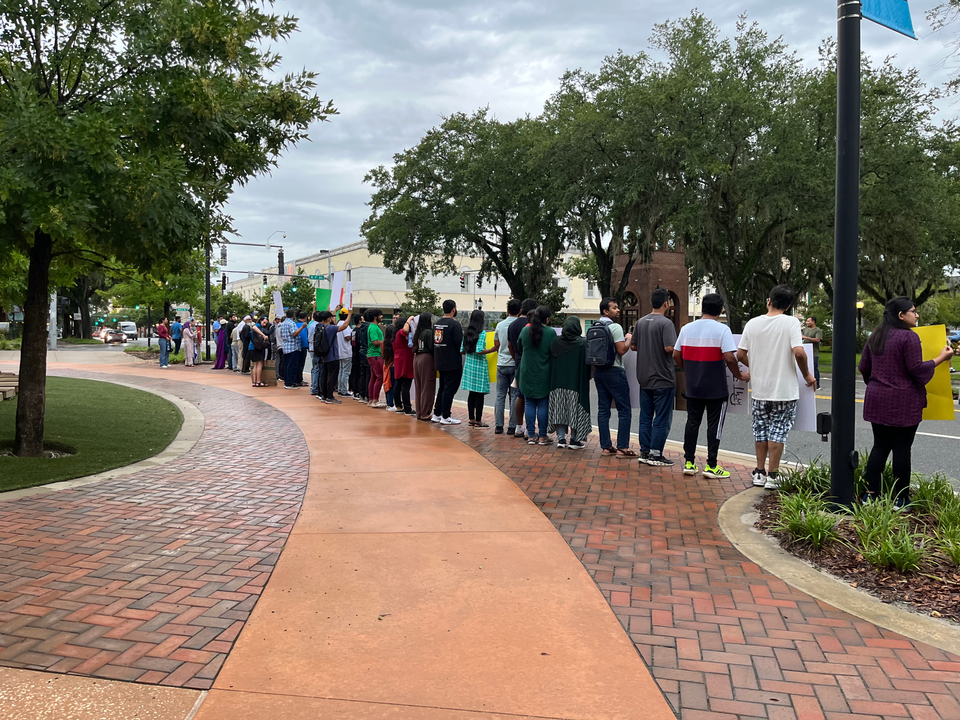
Update Aug 1 | Bangladesh non-profit Shohid has been compiling the names and pictures of all of the killed Bangladeshi protesters and innocent bystanders, many of whom are children.
Bangladeshi Floridians from Gainesville, Alachua County, and Ocala held a demonstration at Bo Diddley Plaza yesterday to protest Bangladeshi Prime Minister Sheikh Hasina’s responsibility for the recent deaths of student protesters.
In the early 1970s, Bangladeshi guerrilla fighters, with the aid of the Indian military, fought against invading Pakistani armies, leading to the establishment of an independent Bangladeshi state. Soon after, laws were established that required veterans, their families, and all their descendants to be granted 30% of the public sector, i.e., government jobs, which are highly coveted in Bangladesh.
Bangladeshi Gainesville resident Jabir Hossain said generation after generation of the quotas makes them increasingly unfair and that there is an extra layer of corruption that isn’t commonly discussed. “Under the ruling Awami League party, it's very easy for anyone under it to claim they fought in the liberation war or that they had a relative who did. That 30% gets blown up higher, and they are not actually related to people who fought in the liberation war….The government systematically used the quota system to fill up government jobs to wield control over all institutions.”
The Student Protest Movement in Bangladesh over the job quotas is generally dated as beginning in 2013 before starting up again in 2018.
A 2021 Report from the U.S. The Department of Treasury suggests the Bangladeshi government under Hasnia has been responsible for the disappearance of Bangladeshi citizens since the year she gained power, reporting allegations from non-governmental organizations (NGO) that there have been “600 disappearances since 2009.”
NGO’s also alleged in the report that there have been “600 extrajudicial killings since 2018 and torture. Some reports suggest these incidents target opposition party members, journalists, and human rights activists.”
In 2018, the movement appeared successful in requiring the government to reform the quotas; however, the Bangladesh Supreme Court walked back on the policy changes, and the protests began again in June 2024, becoming violent in the next month. Since July 16, an estimated 147–211 student protesters have been killed by Bangladesh police.
Former President of the University of Florida (UF) Bangladeshi Students’ Association (BSA), Priyoti Awal, spoke of the local Bangladeshi community’s collective grief and outrage. “Our students back home decided to get on the streets to peacefully protest for a fair system, one where only merit could decide their future. It is extremely tragic and unacceptable how hundreds of unarmed innocent students and civilians lost their lives to the government's actions. These young lives, full of potential and dreams, were more than students; they were brothers, sisters, friends, and future leaders of our country. We at BSA are heartbroken and outraged by this senseless violence. Our hearts ache for the families who have lost their loved ones. As students, we understand the power of education and the promise it holds for a better future. It is devastating to see this promise shattered by acts of brutality.... I urge everyone to use their voices in any way possible—whether by participating in demonstrations, spreading awareness online, or working directly at the grassroots level—to bring change and seek justice. I urge you all to call on authorities and international human rights organizations to take immediate action to investigate the matter and bring justice to our people.”
Sheikh Hasina has been unchallenged as Bangladesh Prime Minister, serving four consecutive terms since she was elected for the second time in 2008. Hasina was regarded as a dictator among attendees, calling the Bangladesh government “Hasina’s regime.”
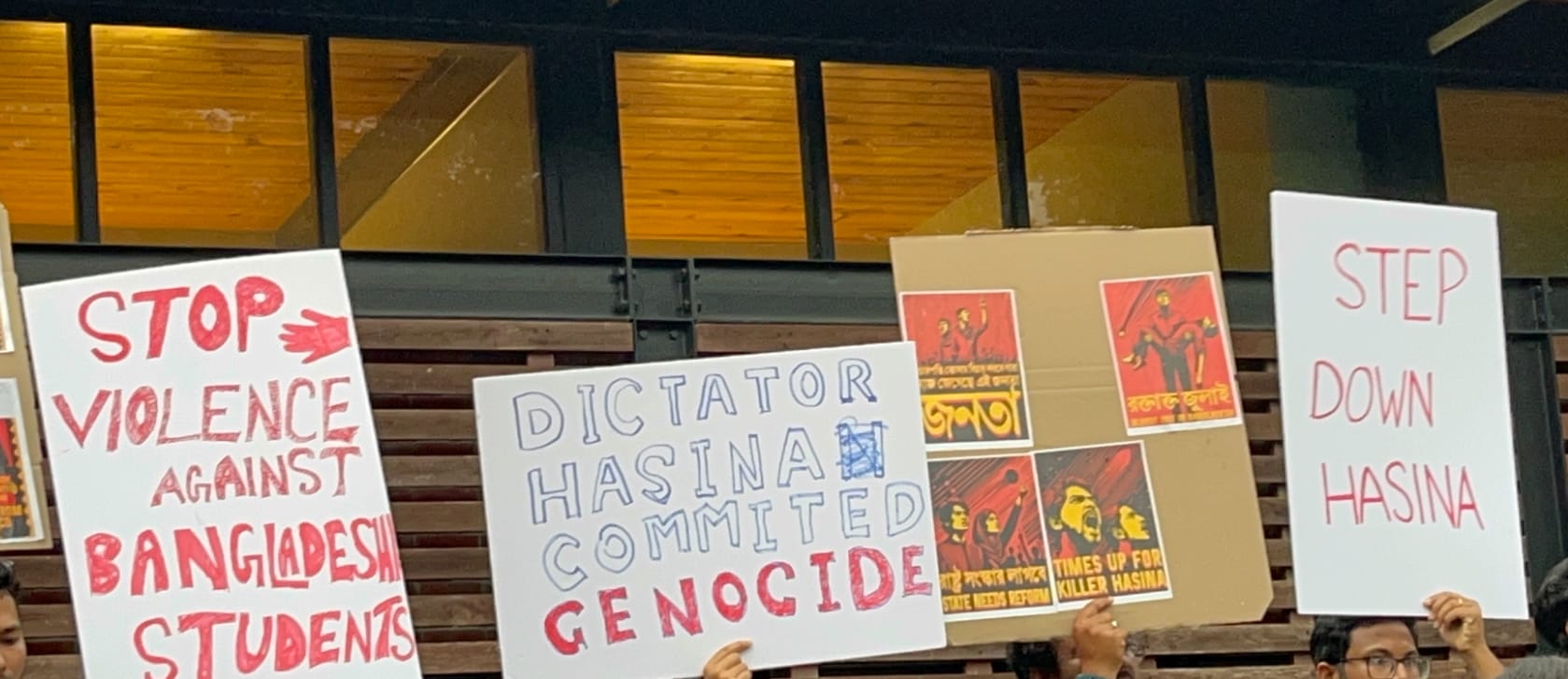
According to a report by The Guardian, “Hasina said the violence was stirred up by political opposition and Islamist groups who were against Bangladesh as a nation and that she had deployed paramilitary and police forces to ‘protect’ the students.”
Videos show Bangladeshi police committing violent crimes against civilians. One of the most prominent videos shared is about the death of Begum Rokeya University English student Abu Sayed, who was killed on July 16 after being shot four times with rubber bullets.
Another video shared on Twitter and Instagram that was reportedly recorded on July 19 shows police hunting down and killing a student who was hiding from them.
Another video shows police shooting from a helicopter. Bangladeshi investigative journalist Zulkarnain Saer reported that Military Institute of Science and Technology student Rakib Hasan was killed in the attack.
Saer has also posted footage reporting Bangladesh Lieutenant Colonel Md. Redwanual Islam shooting at protesters.
Attendees of the protest in Gainesville sent GnvInfo a Google Drive folder with a compilation of dozens of photos and videos documenting various civilian injuries and crimes committed by Bangladeshi police.
One video shows Bangladeshi students picking up the body of a young man whose arm was falling off of his body while the woman who is recording cries.
The collected documentation of photos and videos indicates the majority of victims are college students in their late teens or early 20s; however, the videos also show that young children are among those wounded and killed.
The photos and videos compiled were nearly unanimously violent, generally showing either crimes committed by Bangladeshi police or the dead bodies of young men and children.
Hossain said that this isn’t the first time the Bangladeshi government has killed protesters. “In 2013, there was a mass protest of thousands in my city, and there was no record of that. There is a strong belief that they killed thousands of people that night…. Whoever owns the news or the TV channels is from the government. They control the police [too] because you cannot be a cop if you don’t have a background of being involved with the ruling party…. The same with the border guard [and] the commanding officers in the army; they’re all from the government.”
The violence initially appears to have slowed down after the Bangladesh Supreme Court ruled the veterans quotas to be reduced to 5%; however, Bangladesh police still impose a curfew and hold several student leaders in detention, prompting activists to promise the protests' resumption.
Hossain said the Bangladesh Supreme Court’s decision doesn’t change much on either side, as the issue goes deeper than the quotas. “After they killed a lot of people, just to calm things down [on July 21], they said instead of 30%, it’ll be 5%. The thing is that we know they can revert it back easily…. It's meaningless for them to do it to calm things down because it's not about the quota anymore; it's much bigger. It's a complete uprising. We’re not just talking about quotas; it's against the regime.”
Sanctions have been imposed by the U.S. on Bangladesh law enforcement agency Rapid Action Battalion for human right violations.
On Thursday, Texas House Representative Lloyd Doggett called for further sanctions on the Bangladesh government. “PM Hasina in Bangladesh scorned student protestors as ‘militants’ who deserve deadly force. The only 'militant' is Hasina, who ordered troops in UN peacekeeping vehicles to attack & kill students. The Biden Admin must act boldly against this repression. Sanctions must be imposed.”
President of Medical Staff at the UF Spanish Plaines Hospital, Dr. Hasan Zaman, encouraged attendees to call senators and congresspeople from their districts to convince them to put pressure on Hasina. “The students can do that; just pick up the phone, and there is nothing to lose…. Just say, 'Hey, I’m a UF student’ or ‘I work at UF’ and say that we have concerns about what is happening. Not just the killing; it's a massacre; it’s a genocide; it’s a crime against humanity. People from all over the world can raise their voice against that…. Whenever possible, do something that could have the longest lasting effect.”
